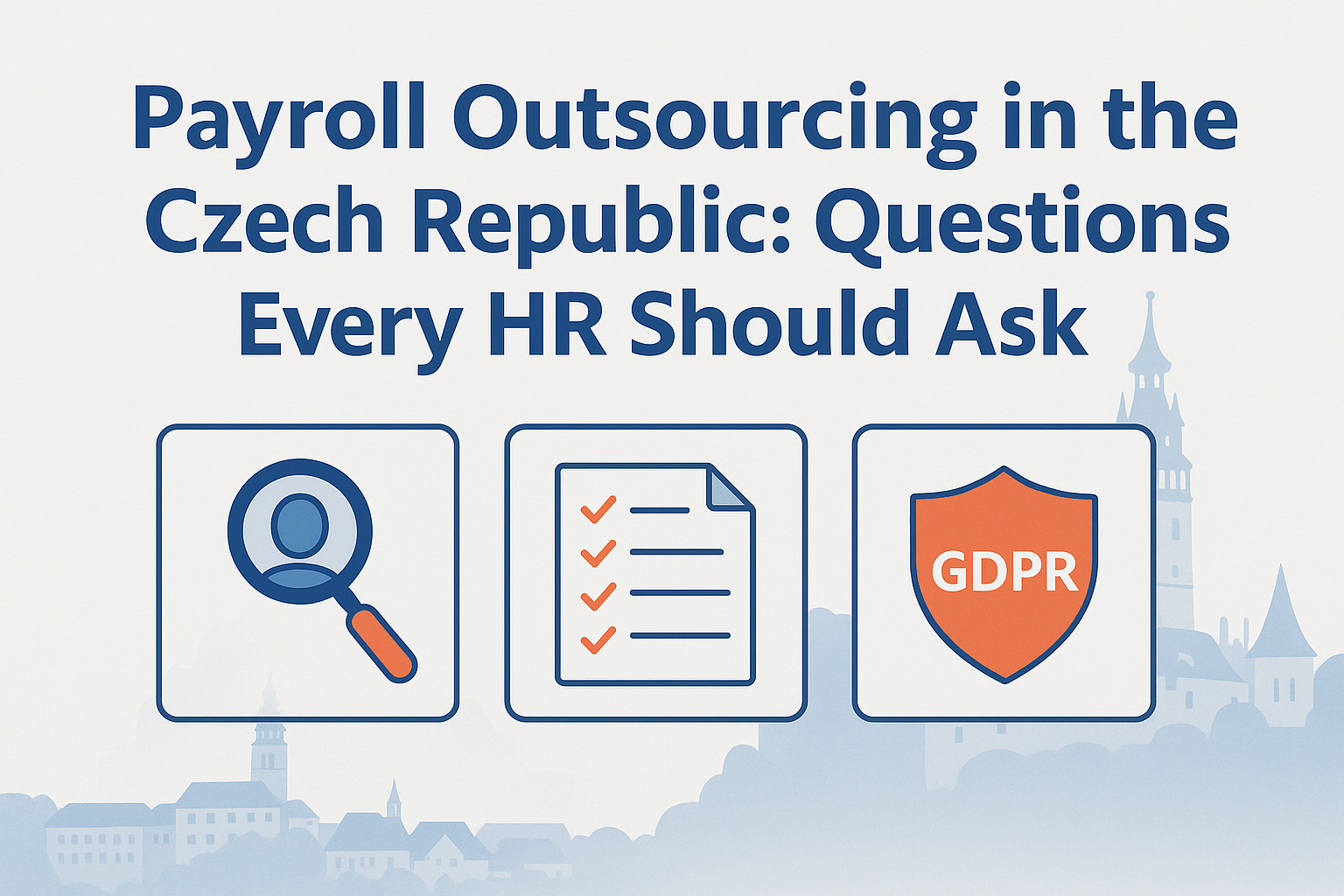In this article
1) Why outsourcing payroll is on the rise 2) Payroll Outsourcing Czech Republic – Key Questions to Ask 3) Best practices for RFP & selection 4) Case examples from practice 5) Common pitfalls 6) FAQ 7) Conclusion & next steps1) Why outsourcing payroll is on the rise
Global companies often find Payroll Outsourcing Czech Republic both challenging and attractive. Strict filings with ČSSZ, health insurers, and the tax authority come with tight deadlines.
GDPR rules make data handling even more sensitive. For foreign HR teams without local know-how, outsourcing payroll to a local specialist often feels like the only safe solution.
2) Payroll Outsourcing Czech Republic – Key Questions to Ask
3) Best practices for RFP & selection
Choosing a payroll provider in Czechia should follow a structured process:
- Define must-haves vs nice-to-haves. For example, English-speaking helpdesk may be a must-have, while API integration could be optional.
- Run a comparable RFP. Ask all vendors the same questions to make results comparable.
- Request references. Contact other clients to check how responsive and accurate the vendor is in real life.
- Pilot or parallel run. Test quality during one month before committing long-term.
- Agree on governance. Monthly operations calls, quarterly KPI reviews, and escalation paths should be written down.
4) Case examples from practice
With 15 employees in Prague, the startup chose the cheapest provider. After three months, errors in health insurance filings created penalties. They had no SLA defined, so corrections took weeks.
With 200+ staff, the company required detailed reporting back to HQ. Their vendor could only provide basic PDF reports, which slowed monthly consolidation. After switching to a provider with CSV/API output, reporting speed improved dramatically.
Hiring expats from non-EU countries, they needed shadow payroll. The first vendor had no experience, creating confusion. Only after switching to a specialist did compliance run smoothly.
5) Common pitfalls
- Payroll Outsourcing Czech Republic ≠ zero work. HR must still provide accurate inputs and validate outputs.
- Choosing purely on price. Low fees often hide extra costs for corrections and off-cycles.
- No KPIs. Without measurable service levels, you cannot enforce quality.
- Unclear scope. Misunderstandings arise if it’s not clear who files returns or communicates with employees.
6) FAQ: Payroll Outsourcing Czech Republic
Yes — even with as few as 10–15 employees, outsourcing can make sense if internal HR capacity is limited. For micro-companies under 5 staff, the cost may outweigh the benefit unless there are complex expat or shift-pay rules.
Transitioning requires careful timing — ideally at year-end or quarter-end. A good vendor will offer parallel runs and a detailed transition checklist to avoid compliance gaps.
Service Level Agreements (SLAs) should define accountability. Clarify who bears penalties and how corrections are communicated to authorities and employees, and within what timeframe.
Not all vendors have this expertise. Always ask upfront whether they handle A1 certificates, equity income, non-EU visa cases, and shadow payroll reporting to home-country authorities.
Need clarity?
7) Conclusion & next steps
Payroll Outsourcing Czech Republic can save time and reduce risks — but only if managed well. Without the right questions, companies risk compliance penalties, delayed filings, and frustrated employees.
What to do next:
- Create a shortlist of reliable providers in Czechia.
- Prepare an RFP with standardized questions covering SLAs, GDPR, scope, and reporting.
- Compare responses side by side to spot gaps and hidden costs.
- Plan a parallel run or pilot month before committing long-term.
Treat outsourcing as strategic vendor management — not just admin delegation — to build a payroll partnership that supports growth instead of slowing it down.
Disclaimer: Informational only. Verify current Czech rules and internal GDPR policies before making outsourcing decisions.
